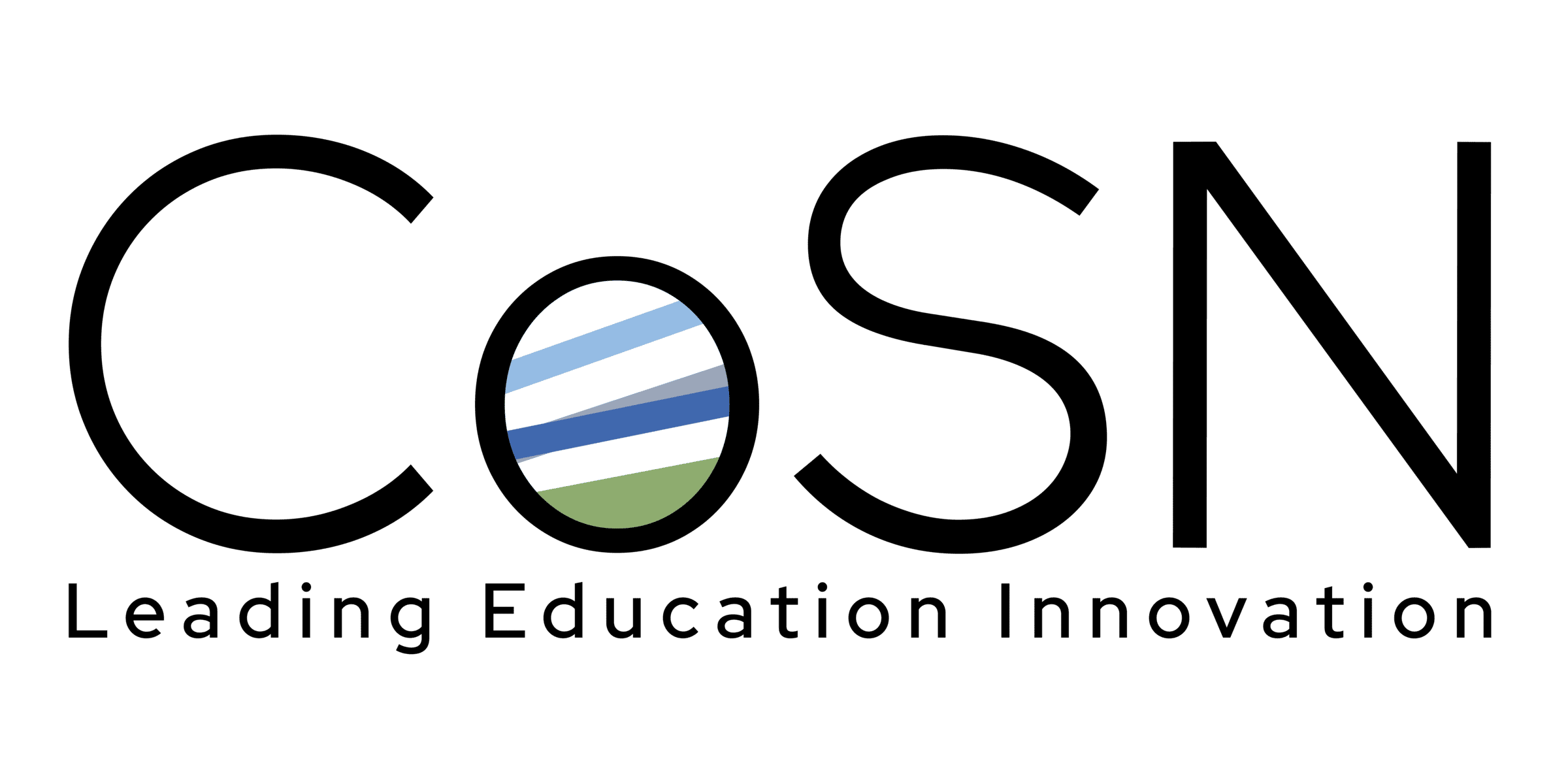Annual Report Highlights Recurring Themes in K-12 Innovation Landscape
Washington, D.C. (February 5, 2025) – CoSN today released the 2025 Driving K-12 Innovation Report, highlighting Hurdles (challenges), Accelerators (mega-trends) and Tech Enablers (tools) that will impact education innovation for the year ahead. This year’s report also highlights Key Bridges — themes connecting today’s education challenges with tomorrow’s opportunities.
CoSN’s Driving K-12 Innovation Advisory Board — made up of approximately 130+ global educators, technologists, changemakers and industry partners — selected the three most important Hurdles, Accelerators and Tech Enablers for the year ahead, known as the “Top Topics.” The 2025 Top Topics share many similarities with recent years, showing how there is still work to be done in these areas.
“The 2025 Driving K-12 Innovation Report urges education leaders to take a holistic approach to the challenges schools face, crafting solutions uniquely tailored with their needs,” said Keith Krueger, CEO, CoSN. “The report isn’t a blueprint for one-size-fits-all answers — it’s a catalyst for meaningful dialogue. We hope it inspires leaders to reflect, collaborate and take bold steps to create learning environments where every student and educator can thrive.”
Hurdles
Roadblocks that force schools to slow down, prepare themselves and make a leap.
- Attracting & Retaining Educators and IT Professionals. Hiring and keeping school staff is a significant problem for school systems; many educators are experiencing low financial compensation and social and emotional burnout, causing them to set aside their passion for teaching and leave the field.
- Evolution of Teaching & Learning. The Evolution of Teaching and Learning is driven by the need to prepare students for a dynamic and interconnected world. As society and technology continue to evolve, education must also adapt to ensure relevance and effectiveness.
- Digital Equity. Digital Equity includes three, interrelated components: digital foundations (including digital literacy), conditions for learning and meaningful learning opportunities.
Accelerators
Real-world megatrends or catalysts that help motivate and increase the speed of innovation.
- Learner Agency. Learner Agency is all about students as active choice-makers in their education; it’s about reconceptualizing their role from that of “student” to that of “learner.” Combined with a strong learning environment, students with agency could transform from order-takers to innovators, experience a state of “flow,” in their learning experiences and learn far more authentically.
- Building the Human Capacity of Leaders. Strengthening the professional community of schools and providing opportunities for educators and all K-12 professionals to learn and master new skills can open the door to innovative practices that can enhance student experiences.
- Changing Attitudes Toward Demonstrating Learning. There is a rising groundswell of discussion around assessing, documenting, communicating and assigning value to student learning. Memorization, cultural biases, limited real-world applications — these are just some of the reasons why traditional testing may not be an effective means of assessment and may not accurately reflect a student’s true understanding of a subject.
Tech Enablers
The tools that grease the wheels for schools to surmount Hurdles and leverage Accelerators.
- Generative Artificial Intelligence (Gen AI). In an era defined by rapid technological advancements, Gen AI has emerged as a transformative force in education. As school systems worldwide explore the benefits and challenges of this technology, they are working hard to meet the urgent need for safe, effective and responsible use of Gen AI.
- Analytics & Adaptive Technologies. These are digital technologies — often powered by AI — that collect and use data related to teaching and learning. Analytics refers to the process of analyzing data collected about student learning and the opportunity to leverage data to inform instructional decision making. Adaptive technologies are tools that adapt to the student based on their interactions with the technology.
- Untethered Broadband & Connectivity. Ubiquitous broadband Internet and the underlying technologies that enable robust connected learning — without requiring devices to be physically connected (via cables, for example). These technologies enable mobility and learning anytime, anywhere.
Key Bridges
Themes connecting today’s education challenges with tomorrow’s opportunities.
- Ethical Innovation centers on the “why” of change, aligning efforts with educational goals like fostering growth, equity and responsible digital citizenship. It emphasizes the importance of responsible design and implementation of new technologies, safeguarding student privacy and promoting equitable access and benefit.
- Personalization emphasizes the need to tailor learning experiences to meet the diverse needs, strengths and aspirations of every student, fostering engagement, learner agency and equity.
- The Future of Work highlights how the rapid and accelerating pace of change (in technology, society, communications, environment and other aspects of life) is transforming the future of work and placing students in an emerging world with social-technical dynamics both congruent and dis-contiguous from ours.
- Critical Media Literacy stresses that students must develop the ability to critically analyze, evaluate and discern the authenticity and credibility of information across various media platforms, giving them the skills needed to distinguish between primary sources, manipulated media and fabricated information.
Download the full report at no-cost here. Learn more about the Driving K-12 Innovation series at https://www.cosn.org/edtech-topics/driving-k-12-innovation/.
CoSN gratefully acknowledges its sponsors for supporting the Driving K–12 Innovation series: ClassDojo, CDW Education, Palo Alto Networks and T-Mobile for Education.
About CoSN
CoSN, the world-class professional association for K-12 EdTech leaders, stands at the forefront of education innovation. We are driven by a mission to equip current and aspiring K-12 education technology leaders, their teams, and school districts with the community, knowledge, and professional development they need to cultivate engaging learning environments. Our vision is rooted in a future where every learner reaches their unique potential, guided by our community. CoSN represents over 13 million students and continues to grow as a powerful and influential voice in K-12 education. cosn.org

